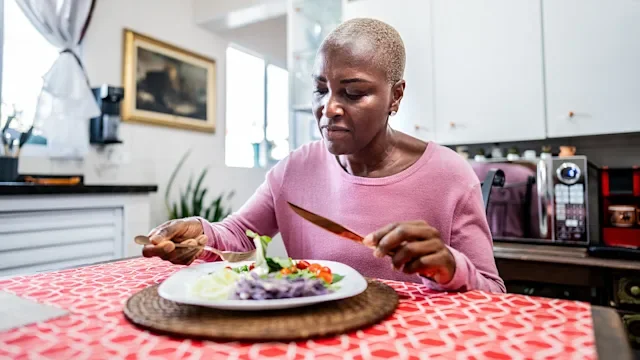Key takeaways:
Lower estrogen levels after menopause can naturally cause less interest in sex, vaginal dryness, and decreased blood flow to the clitoris. These changes make it harder to have an orgasm.
Orgasms — and a fulfilling sex life — are still very possible after menopause. But it may require a different and new approach compared with your sex life before menopause.
Many women start with lubricant, but it may require a little more than this. New types of stimulation, pelvic floor exercises, and communication with your partner can help you explore a whole new type of orgasm after menopause.
It’s common to feel frustrated about your sex life after menopause. Your body has just gone through several physical, hormonal, and emotional changes. And for many women, this makes it harder to orgasm.
But rest assured, you can still have a satisfying and exciting sex life after menopause. Below, we explore the common reasons why it’s more difficult for women to orgasm after menopause. And we’ll share tips to help.
Why is it more difficult for women to orgasm after menopause?
As your body transitions through menopause, there are a lot of different changes that make it more difficult to orgasm. And understanding these changes is a helpful first step in knowing how to improve your sex life in this new stage of life.
Vaginal dryness
Vaginal dryness is a normal part of the aging process. This is due to lower levels of the hormone estrogen, which naturally decline throughout menopause.
Vaginal dryness isn’t related to how much sex someone is (or isn’t) having. One study found that there was no difference in vaginal dryness in women who were sexually active once or twice per month compared with at least once weekly.
Since vaginal dryness can make sex painful, it can make it harder to orgasm.
Vaginal atrophy
Decreasing estrogen levels can also lead to vaginal atrophy. This is when the vaginal tract becomes thin, making it more likely to get inflamed and irritated.
About 50% of women in menopause will experience vaginal atrophy. As you might expect, vaginal atrophy can also make sex more painful and less enjoyable. And similar to vaginal dryness, this makes it harder to experience an orgasm.
An important note here: Vaginal atrophy can also cause bleeding after sex. Even though this is a common cause of bleeding after menopause, any type of vaginal bleeding after menopause should be evaluated by your primary care physician or gynecologist. They can help you rule out other more serious reasons for vaginal bleeding.
Why does sex hurt? Menopause isn’t the only reason you might experience discomfort. Learn what else can cause pain during sex, and what you can do about it.
Treatment for vaginal dryness: Estrogen treatments — either over-the-counter (OTC) or prescription — can help. Find out which one might be best for you.
Mind-body treatments for menopause relief: Mindfulness, hypnosis, and yoga are just some of the techniques that can help manage menopause symptoms.
Tips for great sex as an older adult: From mobility aids to sex toys to lifestyle changes, there are plenty of ways to support a healthy sex life as an older adult.
Painful sex
Both vaginal dryness and atrophy can cause pain during sex. But painful sex after menopause can happen even without these estrogen-related changes. Researchers are still learning more about why some women have pain with sex after menopause. Many women prefer not to report the symptom, so it’s hard to know exactly how often it happens.
Pain during sex may be caused by other reasons, too, like vaginismus. This is the medical term for muscle spasms around the vagina. These spasms can happen for no reason and at any time.
Sex that’s painful naturally takes away from physical enjoyment — and that can make orgasms harder to reach. But it’s also important to note that it can lead to feelings of fear, or even shame and guilt. And these changes to the emotional experience around sex also affect how easy it is to orgasm.
- Vivelle-DotDotti and Estradiol
- ClimaraEstradiol
- DivigelEstradiol
Lower sex drive
Many women report a decrease in sex drive and arousal after menopause. Overall, the most frequently reported symptoms in menopausal women include low sexual desire (40%-55%). Some of this may be because it’s more painful or less pleasurable. But it’s also directly related to lower levels of estrogen — and testosterone — after menopause.
Decreased genital blood flow
In addition to decreasing hormone levels, menopause can come with another important change: decreased blood flow to the clitoris. This can cause a slow response — or no response at all — to stimulation that would normally lead to arousal. This change in female arousal after menopause can make it physically harder to orgasm. Like the other changes on this list, it can also take an emotional toll and cause feelings of frustration.
Incontinence
Urinary incontinence is when someone involuntarily leaks urine. It’s more common after pregnancy, childbirth, and menopause — all of which can weaken the pelvic floor muscles that control the bladder.
Pelvic floor problems don’t just contribute to incontinence — it can also make it harder for those same muscles to contract during orgasm. On top of that, the stress and worry about leaking can make it difficult to relax and enjoy intimacy. Some women even experience urine leakage during sex, which can be distressing and affect confidence and desire. All of these factors can make orgasms harder to reach.
8 tips to help orgasm after menopause
Having an orgasm after menopause is still possible. Below are some tips and measures that can help.
1. Use lubrication
Since vaginal dryness can lead to pain while having sex, keeping these areas moist may help. You can achieve this in several different ways:
Vaginal moisturizers: These can be applied every 2-3 days for long-term moisturization. One study showed that the moisturizing effect lasted 2-3 days longer compared to lubricants. This makes them useful for relieving burning, itching, and irritation.
Lubricants: These are designed for use right before or during sexual activity to help with short-term moisturization. They can be used as needed to help prevent irritation from the rubbing or friction that may occur during sex.
There are different types of lubricants that you can try, including:
Water-based: These lubricants are safe to use with latex and silicone sex toys/devices. These are a good choice if you use condoms or a diaphragm. And there’s some evidence that these cause less irritation than silicone-based lubricants.
Silicone-based: This type of lubricants are waterproof and may last longer, but aren’t recommended for use with silicone sex toys.
Natural: Coconut, avocado, peanut, and olive oil can help lubricate as well. But these aren’t recommended for use with condoms or diaphragms since they can damage latex, the material that condoms and diaphragms are often made of.
Oil-based: Lubricants like petroleum jelly, baby oil, and mineral oil aren’t recommended if you use latex condoms or a diaphragm because oil-based lubricants can damage them. And some studies show that petroleum jelly increases the chances of a person developing a urinary tract infection (UTI).
2. Try direct or stronger stimulation
Your body’s response to touch often changes after menopause, so your usual approach may not work the same way. You may find that you need a different type, pressure, or location of stimulation to feel aroused. For some people, breast stimulation becomes more arousing than before. Others find that stronger or more consistent stimulation works better.
3. Try sex toys
Introducing sex toys is another approach that may help you orgasm after menopause. For example, vibrators offer different speeds and intensity. A higher intensity may be useful after menopause, which provides more direct and intense stimulation to achieve arousal.
Buying and using a sex toy can feel intimidating. But it’s normal and common to use one.
In fact, according to one study, more than half of women and nearly half of men have used a vibrator before. And roughly 40% have used one with a partner. There’s no wrong way to use one — you can try it out on all different places on your body to see what feels enjoyable for you.
4. Do pelvic floor exercises
Pelvic floor exercises, sometimes called Kegel exercises, may help reduce pain and increase pleasure during sex. These exercises involve squeezing and relaxing the muscles at the bottom of your pelvis — near your vagina — to make them stronger.
To test the move, try stopping your pee while urinating. (Don’t do this too often though, since it can increase the risk of UTI.) And it’s actually best to do Kegel exercises when your bladder is empty to avoid putting stress on the floor of your pelvis. Squeeze for about 2-3 seconds if you can before you relax.
You can do Kegels throughout the day. Some studies show that people have improved sexual arousal after just 1 week. Others recommend sticking to it longer (around 8 weeks) for it to remain effective.
5. Communicate with your partner
Keeping open lines of communication with your partner can also help with intimacy. What you and your partner both want out of your sex life may look very different now than it did a few years ago — or even just a few days ago. Try asking them questions, such as:
What does meaningful sex look or feel like to you?
What turns you on or off?
Where do you like to be touched, and how?
Where do you not like to be touched?
When do you feel the most attractive?
When do you like to have sex (morning, afternoon, night)?
When you both can communicate what feels good and what doesn’t, it can help to empower you and your partner during sex. And this applies to intimacy and physical touch outside of sex, too. Don’t be afraid to try new things and experiment together to see what works best and what doesn’t for both of you.
6. Try solo sex
Exploring your own body can be one of the most effective ways to improve sexual satisfaction after menopause. Masturbation lets you discover what types of touch and stimulation feel best for you — and these preferences may change over time. It’s also a way to focus on your own pleasure without any pressure to perform or meet a partner’s expectations.
On top of that, masturbation increases blood flow to the genital area, which can support arousal and make orgasm more likely. For some people, self-stimulation can even help overcome difficulties with orgasm.
7. Focus on more foreplay
After menopause, your body may need more time to get turned on. Extended kissing, touching, and oral stimulation can help build arousal and increase lubrication. Slowing down and focusing on foreplay can also help ease discomfort, reduce stress, and make sex more pleasurable. All of these factors can help make orgasm more likely.
8. Talk with a healthcare professional
Last but not least, talking with a primary care or gynecology professional may help. Especially if none of the above options are helping. They may be able to suggest treatment options, such as:
Vaginal suppositories that contain estrogen
Hormone therapy in the form of pills or patches
Sex therapy or counseling
Pelvic floor therapy, which is a special type of therapy for your genital muscles that can help relieve tension and reduce pain during sex
Vaginal dilators, which are tube-shaped devices that gradually help stretch the vagina
A healthcare professional can also check to see if anything else is going on. They can diagnose medical conditions that might be affecting sexual functioning (for example, conditions like hypoactive sexual desire disorder or sexual aversion disorder).
Frequently asked questions
There isn’t a specific age in which women stop getting wet, or producing natural lubrication. After menopause, lower estrogen levels can make vaginal dryness more common. But this doesn’t happen to everyone, and some women experience difficulty with lubrication even before menopause.
Having sex after menopause has benefits that go beyond pleasure and satisfaction. The benefits of sex after menopause include: better heart health, immune function, pelvic floor strength, mental health, cognitive function, and sleep. Some research suggests that people who have sex at least once a week even live longer than those who don’t.
After menopause, you no longer need to use condoms for birth control. But they are still important for protecting against sexually transmitted infections (STIs). In fact, lower estrogen levels can make the vaginal lining thinner and more fragile, which may increase the risk of getting an STI from unprotected sex. If you aren’t in a monogamous relationship, you should still use condoms for prevention of STIs. If you are in a long-term monogamous relationship, talk with a healthcare professional you trust about whether you can safely stop using condoms.
There isn’t a specific age in which women stop getting wet, or producing natural lubrication. After menopause, lower estrogen levels can make vaginal dryness more common. But this doesn’t happen to everyone, and some women experience difficulty with lubrication even before menopause.
Having sex after menopause has benefits that go beyond pleasure and satisfaction. The benefits of sex after menopause include: better heart health, immune function, pelvic floor strength, mental health, cognitive function, and sleep. Some research suggests that people who have sex at least once a week even live longer than those who don’t.
After menopause, you no longer need to use condoms for birth control. But they are still important for protecting against sexually transmitted infections (STIs). In fact, lower estrogen levels can make the vaginal lining thinner and more fragile, which may increase the risk of getting an STI from unprotected sex. If you aren’t in a monogamous relationship, you should still use condoms for prevention of STIs. If you are in a long-term monogamous relationship, talk with a healthcare professional you trust about whether you can safely stop using condoms.
The bottom line
Your body goes through a lot of physical and mental changes in menopause. And many of these changes can make your sex life less enjoyable — or even feel completely out of reach.
But your sex life doesn’t have to end after menopause. It may just mean you have to take a different approach. It may feel completely new (or scary) to explore different methods of sexual arousal. Talk with your partner about your sex life. These steps could also mean the beginning of a new, fun chapter in your sex life.

Why trust our experts?



References
Cavkaytar, S., et al. (2015). Effect of home-based Kegel exercises on quality of life in women with stress and mixed urinary incontinence. Journal of Obstetrics and Gynaecology.
Crouch, M. (2022). 12 surprising health benefits of sex after 50. AARP.
Edwards, D., et al. (2015). Treating vulvovaginal atrophy/genitourinary syndrome of menopause: How important is vaginal lubricant and moisturizer composition? Climacteric.
Faubion, S. S., et al. (2015). Sexual dysfunction in women: A practical approach. American Family Physician.
Geibel, S. (2013). Condoms and condiments: Compatibility and safety of personal lubricants and their use in Africa. Journal of the International AIDS Society.
Gracia, C. R., et al. (2018). Predictors of decreased libido in women during the late reproductive years. Menopause.
Huang, Y., et al. (2023). Kegel exercises. StatPearls.
Kennedy, C. E., et al. (2022). Lubricants for the promotion of sexual health and well-being: A systematic review. Sexual and Reproductive Health Matters.
Liz. (2023). How sex can change after menopause. Planned Parenthood.
Mac Bride, M. B., et al. (2010). Vulvovaginal atrophy. Mayo Clinic Proceedings.
Montgomery, K. A. (2008). Sexual desire disorders. Psychiatry.
NHS Inform. (2023). Sexual wellbeing, intimacy and menopause. National Health Service.
Office on Women’s Health. (2025). Menopause and sexuality. U.S. Department of Health and Human Services.
Rullo, J. E., et al. (2018). Genital vibration for sexual function and enhancement: Best practice recommendations for choosing and safely using a vibrator. Sexual and Relationship Therapy.
Scavello, I., et al. (2019). Sexual health in menopause. Medicina.
Streicher, L. F. (2023). Diagnosis, causes, and treatment of dyspareunia in postmenopausal women. Menopause.
The Menopause Society. (n.d.). Sexual health.
Thomtén, J., et al. (2013). A psychological view of sexual pain among women: Applying the fear-avoidance model. Women’s Health.
Uzelac, E. (2023). What sex is really like in your 50s, 60s and 70s. AARP.
Waetjen, L. E., et al. (2018). Factors associated with developing vaginal dryness symptoms in women transitioning through menopause: A longitudinal study. Menopause.
Wallace, S. L., et al. (2019). Pelvic floor physical therapy in the treatment of pelvic floor dysfunction in women. Current Opinion in Obstetrics and Gynecology.














